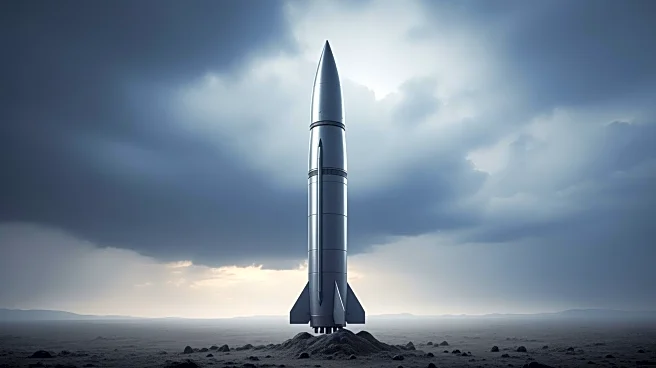What's Happening?
President Donald Trump has instructed the Pentagon to restart nuclear weapons testing, citing the nuclear testing activities of other nations. This directive marks a significant shift in U.S. policy, as the country has not conducted a live nuclear test since
1992. The decision follows recent reports of Russia testing a nuclear-powered torpedo and a cruise missile. Trump announced the decision after meeting with Chinese President Xi Jinping, emphasizing the need for the U.S. to match other countries' testing efforts. The Department of Defense, recently renamed the Department of War, is expected to begin the testing process immediately.
Why It's Important?
The resumption of nuclear testing by the U.S. could have profound implications for global nuclear stability. It signals a potential escalation in nuclear arms development, which may prompt other nations to enhance their own arsenals. This move could disrupt existing arms control agreements, such as the Comprehensive Nuclear Test Ban Treaty, and may lead to increased tensions between nuclear-armed states. The decision also raises concerns about the environmental and health impacts of nuclear testing, particularly in regions near test sites.
What's Next?
The announcement is likely to provoke reactions from international leaders and organizations advocating for nuclear disarmament. The U.S. may face diplomatic challenges as it seeks to justify its decision on the global stage. Domestically, there could be public opposition, especially from communities near potential test sites. The administration may also need to address legal and regulatory hurdles before resuming tests. Additionally, this development could influence upcoming negotiations on arms control treaties, particularly with Russia and China.
Beyond the Headlines
The decision to resume nuclear testing may reflect broader geopolitical strategies, including the U.S.'s approach to maintaining its nuclear deterrent capabilities. It also highlights the ongoing challenges in achieving global nuclear disarmament and the complexities of international security dynamics. The move could lead to a reevaluation of U.S. defense policies and priorities, potentially impacting military spending and research in nuclear technologies.

















